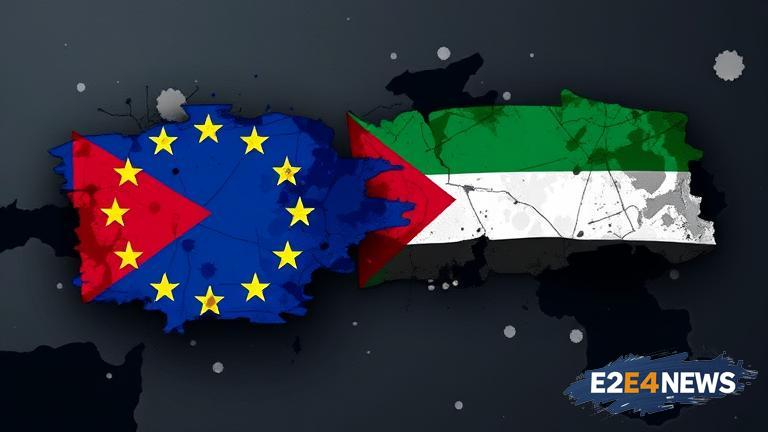The European Union has long been a key player in the Israeli-Palestinian conflict, with the bloc providing significant financial and diplomatic support to the Palestinian Authority. However, the EU’s stance on the Gaza crisis has been subject to intense scrutiny, with some critics arguing that the bloc has not done enough to address the humanitarian crisis in the region. The Gaza Strip, a coastal enclave bordering Egypt and Israel, has been under an Israeli blockade since 2007, leading to widespread poverty, unemployment, and a severe shortage of basic necessities like food, water, and medicine. The EU has consistently called for an end to the blockade, but its efforts have been hindered by the complex web of international relations and geopolitical interests. The EU’s relationship with Israel is built on a strong foundation of economic and strategic cooperation, with the two sides enjoying a robust trade partnership and collaborating on a range of issues, including counter-terrorism and energy security. However, the EU’s support for Israel has often been at odds with its commitment to upholding international law and protecting human rights, particularly in the context of the Israeli-Palestinian conflict. The EU has been a vocal critic of Israel’s settlement expansion, which is widely regarded as a major obstacle to a two-state solution, and has imposed sanctions on Israeli entities involved in settlement activities. Despite these efforts, the EU’s influence over Israel’s policies has been limited, and the bloc has struggled to make a meaningful impact on the ground. The situation in Gaza is further complicated by the presence of Hamas, a militant Islamist group that has controlled the territory since 2007. The EU has designated Hamas as a terrorist organization, but the bloc has also engaged with the group in an effort to promote a peaceful resolution to the conflict. The EU’s engagement with Hamas has been controversial, with some critics arguing that it legitimizes the group’s violent tactics and undermines the Palestinian Authority’s efforts to negotiate a peaceful settlement. The Gaza crisis has also had significant humanitarian implications, with the United Nations warning of a catastrophic collapse of the territory’s infrastructure and a severe shortage of basic necessities. The EU has responded to the crisis by providing significant humanitarian aid, including food, shelter, and medical assistance, but the bloc’s efforts have been hindered by the Israeli blockade and the lack of a coherent international strategy. The EU’s approach to the Gaza crisis has been shaped by its commitment to upholding international law and protecting human rights, but the bloc’s efforts have often been frustrated by the complex web of international relations and geopolitical interests. The EU has called for a two-state solution, with Israel and Palestine living side by side in peace and security, but the bloc’s ability to promote this vision has been limited by its lack of leverage over the parties involved. The EU’s relationship with the United States has also played a significant role in shaping its approach to the Gaza crisis, with the bloc often finding itself at odds with the US over issues like settlement expansion and the status of Jerusalem. The EU has also engaged with other international actors, including the Arab League and the Organization of Islamic Cooperation, in an effort to promote a peaceful resolution to the conflict. Despite these efforts, the Gaza crisis remains one of the most intractable conflicts in the world, with the EU and other international actors struggling to make a meaningful impact on the ground. The EU’s commitment to upholding international law and protecting human rights remains a key aspect of its approach to the conflict, but the bloc’s ability to promote a peaceful resolution will depend on its ability to navigate the complex web of international relations and geopolitical interests. The EU’s stance on the Gaza crisis has significant implications for its relationships with other countries in the region, including Israel, Palestine, and the Arab states. The EU’s ability to promote a peaceful resolution to the conflict will also depend on its ability to engage with a range of international actors, including the United States, the United Nations, and the Arab League. The Gaza crisis is a complex and multifaceted issue, with the EU’s approach shaped by a range of factors, including its commitment to upholding international law, its relationship with Israel and Palestine, and its engagement with other international actors. The EU’s efforts to promote a peaceful resolution to the conflict will require a sustained and coordinated approach, with the bloc working closely with other international actors to address the humanitarian crisis in Gaza and promote a two-state solution. The EU’s stance on the Gaza crisis has sparked intense debate, with some critics arguing that the bloc has not done enough to address the humanitarian crisis in the region. The EU’s approach to the conflict has been shaped by its commitment to upholding international law and protecting human rights, but the bloc’s efforts have often been frustrated by the complex web of international relations and geopolitical interests. The EU’s relationship with Israel is built on a strong foundation of economic and strategic cooperation, but the bloc’s support for Israel has often been at odds with its commitment to upholding international law and protecting human rights. The EU’s engagement with Hamas has been controversial, with some critics arguing that it legitimizes the group’s violent tactics and undermines the Palestinian Authority’s efforts to negotiate a peaceful settlement. The Gaza crisis has significant implications for the EU’s relationships with other countries in the region, including Israel, Palestine, and the Arab states. The EU’s ability to promote a peaceful resolution to the conflict will depend on its ability to navigate the complex web of international relations and geopolitical interests, and to engage with a range of international actors, including the United States, the United Nations, and the Arab League.





